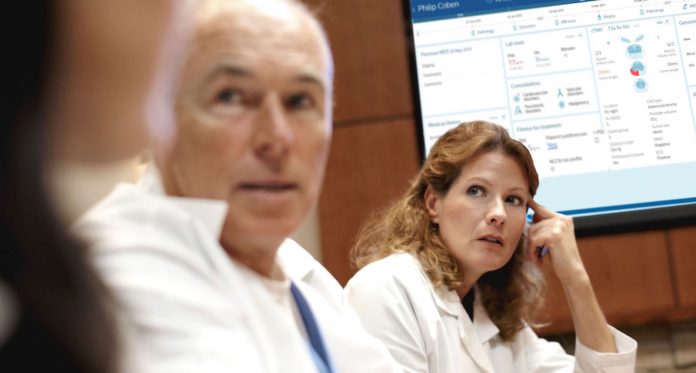
Four years ago, the Dana-Farber Cancer Institute launched an internal tool called Clinical Pathways that aimed to provide its oncologists with an electronic roadmap to the best treatments available for individual cancers and their current stage. The goal: to provide all cancer patients, whether seen at Dana-Farber’s research facility in Boston or any of its affiliated centers with the same, level of care based on the organizations latest clinical knowledge.
Now Dana-Farber is brining Clinical Pathways to a significantly wider group of users via a new agreement with Philips which will see the clinical care tool integrated with, and deployed through, the Philips IntelliSpace Oncology Platform. Via the partnership with Philips announced on May 31, information from Clinical Pathways will be delivered to treating oncologists through their existing electronic health record (EHR) platforms along with other health data including genomic testing to help develop the most appropriate treatment plan for each patient.
“Clinical Pathways is a platform and process for bringing together our disease experts for many different cancers to try to figure out what is the best care we can provide a patient at every step along their journey,” said David Jackman, M.D., medical director of Clinical Pathways at Dana-Farber Cancer Institute. “As we got sense of what Philips’ current footprint in healthcare is and looking at their IntelliSpace product is, we became very excited with the synergy. For what they are looking to collect from a medical record and put in front of a practicing clinician in a meaningful way to encourage communication and facilitate decision making seemed to go perfectly with our Clinical Pathways.”
Under the deal, Philips becomes the exclusive partner bringing the clinical decision care platform to oncologists worldwide outside the confines of Dana-Farber’s affiliated networks of oncologists.
“When it comes to treatment decisions, how could they scale that outside of Dana-Farber?” asked Louis Culot head of oncology informatics for Philips. “To do that you need a partner that has strength in healthcare informatics and has a commercial footprint. There is a limit to what any academic medical center can do in terms of influencing cancer care unless they can broadcast that out. For something like this there is no commercial vehicle and technology for them to do that. We can help bring this to a global audience.”
One example provided by the companies of how Clinical Pathways can help patients is in myelogenous leukemia. In a patient who is progressing after first-line treatment there can be more than a dozen different possible genetic mutations causing resistance to treatment, as well as a number of targeted therapies based on these mutations—all with varying side effects. Pathways helps doctors quickly sort through all of the possibilities to provide the most appropriate treatment plan for each patient.
Dana-Farber first began work on its Pathways program in 2012 and launched the clinical tool internally in 2014 to help guide treatment of non-small cell lung cancer (NSCLC). It has since added treatment pathways for a broad range of cancers based on internal best practices and patient outcomes. The goal of the program, Jackman noted was that “as cancer care becomes more complex, it is critically important that we provide all of our physicians with the expertise that we have, so that it doesn’t matter who you see in our organization. Whether it is in Boston or at one of our satellites, or whether it is the world expert our one of physicians who just finished a fellowship, you are going to get the same advice and same care everywhere.”
In addition, it allowed Dana-Farber to put all of its clinical trials on the platform to inform physicians and provide these options to a broader base of patients who otherwise might ot have known an appropriate trial was available to them. “It’s discouraging to see how few patients in adult oncology throughout the United States actually participate in a clinical trial,” Jackman continued. “While we in no way want to force people to participate in a clinical trial we want to inform as many people as we can that this is an option to them and this is a good way to do that.”
For Philips adding Clinical Pathways is the company’s latest step to add as much valuable clinical insight as it can to the IntelliSpace platform. In late 2016, the company announced it would work with molecular clinical decision support company N-of-One which provides curated gene-drug advice for oncology.
While it might seem at first blush these are competing technologies, Culot says they are more complementary. “N-of-One has experts and staff who curate information from the published literature around gene variant-disease combinations,” he said. “The pathways for cancer care a very prescriptive, which might make one think we don’t need N-of-One. But the question becomes: ‘What happens if I have a variant that is not well characterized and hasn’t risen to the level of evidence where you would put it on a pathway?’ And that is why we need both approaches. One that is literature based, on guidelines that is off pathway, and the other that is on pathway.”












